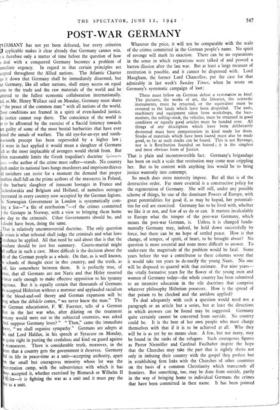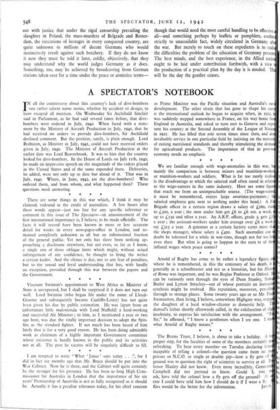POST-WAR GERMANY
GERMANY has not yet been defeated, but every criterion applicable makes it clear already that Germany cannot win. k is therefore only a matter of time before the question of how D deal with a conquered Germany becomes a problem of gmediate urgency. In regard to that certain principles are tcepted throughout the Allied nations. The Atlantic Charter lays it down that Germany shall be immediately disarmed, but hat Germany, like all other nations, shall enjoy access on equal arras to the trade and the raw materials of the world and be 'tted to the fullest economic collaboration internationally.
d, as Mr. Henry Wallace said on Monday, Germany must share " the peace of the common man " with all nations of the world.
ose conditions are framed in a spirit of even-handed justice.
justice cannot stop there. The conscience of the world is it to be affronted by the exercise of a flaccid leniency towards n guilty of some of the most bestial barbarities that have ever tied the annals of warfare. The old eye-for-an-eye and tooth- -a-tooth precept has been superseded by a higher law ; it were in fact applied it would mean a slaughter of Germans ch as the most implacable of avengers would shrink from. But thin reasonable limits the Greek tragedian's doctrine 8 p( crul,TL tkil' —the author of the crime must suffer—stands. No country ch under its national laws hangs murderers and imprisons thieves ravishers can resist for a moment the demand that proper aides shall fall on the prime authors of the massacres in Poland, the barbaric slaughter of innocent hostages in France and choslovakia and Belgium and Holland, of nameless outrages trated in every country now occupied by the German legions.
Norwegian Government in London is systematically corn- g a list—" a file of retribution "—of the crimes committed the Gestapo in Norway, with a view to bringing them home e day to the criminals. ether Governments should be, and doubt have been, doing the same.
That is relatively uncontroversial doctrine. The only question t arises is what tribunal shall judge the criminals and what laws evidence be applied. All that need be said about that is that the ocedure should be just but summary. Courts-martial might • I suffice in such a case. More difficult is the decision about the It of the German people as a whole. On that, as is well known, schools of thought exist in this country, and the truth, as al, lies somewhere between them. It is perfectly true, of rse, that all Germans are not Nazis and that Hitler resorted force early enough to make effective opposition to his tyranny gerous. But it is equally certain that thousands of Germans o accepted Hitlerism without a murmur and applauded racialism the blood-and-soil theory and German expansion will be g when the debacle comes, " we never knew the man." The t German educationist, F. W. Foerster, tells of a German :a in the last war who, after dilating on the treatment • -many would mete out to the subjected countries, was asked knd suppose Germany loses? " " Then," came the immediate wet., " we shall organise sympathy." Germans are adepts at t, and Lord Halifax, in his speech at Syracuse on Monday, quite right in putting the credulous and kind on guard against manoeuvre. There is considerable truth, moreover, in the m that 01 country gets the government it deserves. Germany its life in peace-time as a unit—accepting authority, apart the small but courageous minority whose lot was the entration camp, with the subservience with which it has Ys accepted it, whether exercised by Bismarck or Wilhelm II Hider—it is fighting the war as a unit and it must pay the as a unit. Whatever the price, it will not be comparable with the scale of the crimes committed in the German people's name. No spirit of revenge will mark its exaction. There can be no reparations in the sense in which reparations were talked of and proved a barren illusion after the last war. But at least a large measure of restitution is possible, and it cannot be dispensed with. Lord Maugham, the former Lord Chancellor, put the case for that admirably in last week's Sunday Times, when he wrote on Germany's systematic campaign of loot: There must follow on German defeat a restoration in kind. The pictures, the works of art, the libraries, the scientific instruments, must be returned, or the equivalent must be restored to the lands which have been despoiled. The tools, machinery and equipment taken from workshops, the loco- motives, the rolling-stock, the vehicles, must be returned in good condition or equally good articles must be handed over. All things of any description which have been deliberately destroyed must have compensation in kind made for them. Stocks of materials which have been looted must also be made good, so far as such stocks can be found. This is not Revenge, nor is it Retribution founded on hatred ; it is the simplest and most obvious form of Justice.
That is plain and incontrovertible fact. Germany's brigandage has been on such a scale that restitution may come near crippling her. But to be content with anything less would be to bring justice wantonly into contempt.
So much does stern necessity impose. But all that is of the destructive order. Far more essential is a constructive policy for the regeneration of Germany She will still, under any possible scheme of things, be one of the dominant Powers of Europe, with great potentialities for good if, as may be hoped, her potentiali- ties for evil are exorcised. Germany has to be lived with, whether we like it or not, and few of us do or can. It matters incalculably to Europe what the temper of the post-war Germany, which means the post-war German, is. Unless it is changed funda- mentally Germany may, indeed, be held down successfully by force, but there can be no hope of settled peace. How is that change, of temper, of spirit, of heart, to be brought about? No question is more essential and none more difficult to answer. To under-rate the magnitude of the problem would be fatal. Some years before the war a contributor to these columns wrote that it would take ten years to de-nazify the young Nazis. No one will be disposed to quarrel with that estimate. For nine years— the vitally formative years for the flower of the young men and women of Germany today—the whole country has been submitted to an intensive education in the vile doctrines that comprise whatever philosophy Hitlerism possesses. How is the spread of that poison to be checked and the antidote applied?
To deal adequately with such a question would need not a paragraph or an article but a series, but at least the directions in which answers can be found may be suggested. Germany quite certainly cannot be converted from outside. No country could be. It is the best of her own people who must charge themselves with that if it is to be achieved at all. Who they will be is as yet by no means clear. A few, but not many, may be found in the ranks of the refugees. Such courageous figures as Pastor Niemiiller and Cardinal Faulhaber inspire the hope that the Churches may take the part that is rightly theirs not only in imbuing their country with the gospel they profess but in establishing firm links with the Churches of other countries on the basis of a common Christianity which transcends all frontiers. But something, too, may be done from outside, partly in the way of bringing home to individual Germans the crimes that have been committed in their name. It has been pointed out with justice that under the rigid censorship prevailing the slaughter in Poland, the mass-murders of Belgrade and Rotter- dam, the executions of hostages in every conquered country, are quite unknown to millions of decent Germans who would instinctively revolt against such butchery. If they do not know it now they must be told it later, coldly, objectively, that they may understand why the world judges Germany as it does. Something, too, may be achieved by broadcasting from German stations taken over for a time under the peace or armistice terms— though that would need the most careful handling to be effective all—and something perhaps by leaflets or pamphlets, confin strictly to unassailable fact, widely circulated in Germany aft the war. But merely to touch on these expedients is to reali the difficulties the problem of the education of Geripany presen The best minds, and the best experience, in the Allied natio ought to be laid under contribution forthwith, with a view the production of a practical plan by the day it is needed. will be the day the gunfire ceases.



























 Previous page
Previous page